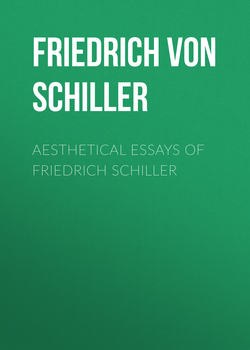Читать книгу Aesthetical Essays of Friedrich Schiller - Фридрих Шиллер, Friedrich von Schiller - Страница 2
Part of the nineteenth century seems to take in hand the task of
Оглавлениеreconstructing the moral edifice and of giving back to thought a larger form. The literary result of its effects is the renaissance of lyrical poetry with an admirable development in history.
Schiller's most brilliant works were in the former walk, his histories have inferior merit, and his philosophical writings bespeak a deep thinking nature with great originality of conception, such as naturally results from a combination of high poetic inspiration with much intellectual power.
Schiller, like all great men of genius, was a representative man of his country and of his age. A German, a Protestant free-thinker, a worshipper of the classical, he was the expression of these aspects of national and general thought.
The religious reformation was the work of the North. The instinct of races came in it to complicate the questions of dogmas. The awakening of individual nationalities was one of the characters of the epoch.
The nations compressed in the severe unity of the Middle Ages escaped in the Reformation from the uniform mould that had long enveloped them, and tended to that other unity, still very distant, which must spring from the spontaneous view of the same truth by all men, result from the free and original development of each nation, and, as in a vast concert, unite harmonious dissonances. Europe, without being conscious of its aim, seized greedily at the means – insurrection; the only thought was to overthrow, without yet thinking of a reconstruction. The sixteenth century was the vanguard of the eighteenth. At all times the North had fretted under the antipathetic yoke of the South. Under the Romans, Germany, though frequently conquered, had never been subdued. She had invaded the Empire and determined its fall. In the Middle Ages the struggle had continued; not only instincts, but ideas, were in conflict; force and spirit, violence and polity, feudalism and the Catholic hierarchy, hereditary and elective forms, represented the opposition of two races. In the sixteenth century the schism long anticipated took place. The Catholic dogma had hitherto triumphed over all outbreaks – over Arnaldo of Brescia, the Waldenses, and Wickliffe. But Luther appeared, and the work was accomplished: Catholic unity was broken.
And this breaking with authority went on fermenting in the nations till its last great outburst at the French Revolution; and Schiller was born at this convulsive period, and bears strong traces of his parentage in his anti-dogmatic spirit.
Yet there is another side to Germanism which is prone to the ideal and the mystical, and bears still the trace of those lovely legends of mediaeval growth to which we have adverted. For Christianity was not a foreign and antagonistic importation in Germany; rather, the German character obtained its completeness through Christianity. The German found himself again in the Church of Christ, only raised, transfigured, and sanctified. The apostolic representation of the Church as the bride of Christ has found its fullest and truest correspondence in that of Germany. Hence when the German spirit was thoroughly espoused to the Christian spirit, we find that character of love, tenderness, and depth so characteristic of the early classics of German poetry, and reappearing in glorious afterglow in the second classics, in Klopstock, Herder, and, above all, Schiller.
It is this special instinct for the ideal and mystical in German nature that has enabled spirits born of negation and revolution, like Schiller, to unite with those elements the most genial and creative inspirations of poetry.
